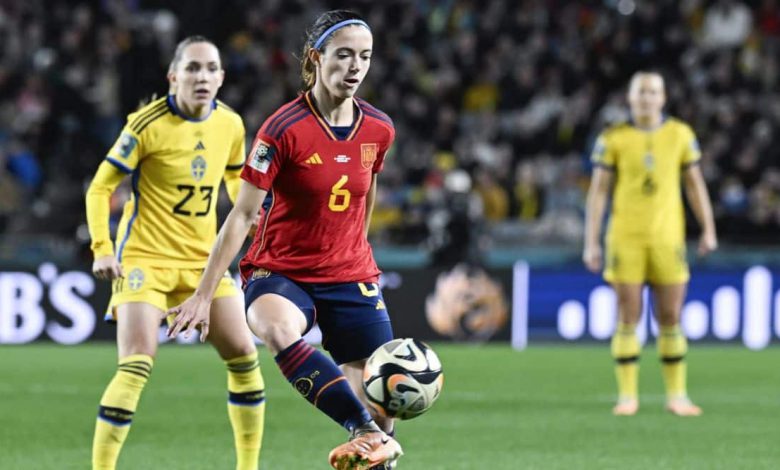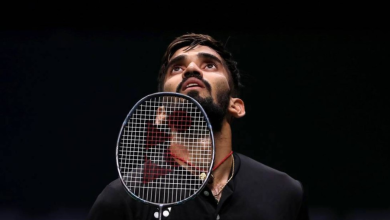Building on Barcelona’s success, Spain is playing its first Women’s World Cup final against England | Football News

If those precise passes that untangle defenses and the attacks coming from all angles first-time Women’s World Cup final Spain look familiar, there is good reason.The Spanish squad is built on a core of Barcelona players who have triumphed with their club and are now one step from the ultimate prize when they face England on Sunday in Sydney.Nine Barcelona players, including two-time Ballon d’Or winner Alexia Putellas, attacking midfielder Aitana Bonmatí and defensive leader Irene Paredes, are among the key players for Spain.
The club’s influence also extends to the England team, which features Barcelona players Lucy Bronze and Keira Walsh.
“Some of us are very lucky, we’ve won two Champions Leagues with Barcelona,” Bonmatí said after beating Sweden 2-1 in the semifinals.
Barcelona’s women’s team has played in front of record crowds exceeding 90,000, Bonmati added, “but playing a World Cup final in front of 75,000, it will be crazy.” “I can’t believe it’s going to happen. Am I in a dream?” This surprising run a generation of women who started their careers with few of the advantages of their male counterparts has ended up on a similar path when it comes to taking Spain to the top.
Just as Spain’s 2010 World Cup champion team included seven Barcelona members — led Andrés Iniesta, Xavi Hernández and Carles Puyol — and coincided with the club’s best years, the rise of the national women’s team comes after Barcelona’s women established themselves as one of Europe’s elite teams.
Barcelona’s women’s team has reached four of the last five Champions League finals, winning two, including a 3-2 comeback over Wolfsburg in June.
It has also won four consecutive Spanish league titles. This growth came a decade after Barcelona started seriously investing in its women team.
“You only have to look back five or 10 years, the change is incredible,” Putellas said. “When there has been a bit of investment, or federations and certain clubs have provided greater support, we have seen radical change.” Similar to those great “tiki-taka” sides of Iniesta and Xavi, Spain’s women also dominate possession, press quickly to recover lost balls in opposing territory, and like to dictate the pace. Spain leads the tournament in passing accuracy (84%), right in front of England (83%), according to OPTA Analyst statics.
As well as Putellas and Bonmatí, Barcelona has provided 19-year-old winger Salma Paralluelo, a player who has given Spain a much more versatile attack. Her goals were key to beating the Netherlands 2-1 in the quarterfinals and to beating Sweden.
In that group of Barcelona-trained players could also go Pachuca forward Jenni Hermoso, who had two stints with Barcelona and helped them win their first European Cup in 2019.
Spain leads the tournament with 17 goals, to 13 for England. They have spread the scoring around: Bonmatí, Hermoso and Alba Redondo each have three.
Spain coach Jorge Vilda is also steeped in Barcelona’s tactics. Vilda’s father was a physical trainer for Barcelona’s men’s team under Johan Cruyff. The son declares himself a follower of the passing attack that Cruyff made the hallmark style of its teams.
As a child, Vilda trained at Barcelona’s La Masia academy at the same time as Xavi, the midfielder who coaches Barcelona’s men. He has spent most of his career inside the Spanish federation, first leading its youth squads before taking over the senior women’s team in 2015 following a player revolt against his predecessor.
“We tell the players who come (to the national teams) for the first time when they are 13, 14 years old about how they need to apply pressure, how they must keep control of the ball and attack,” Vilda told Spanish newspaper El País in a recent interview.
“And even though I have absorbed things from different coaches, like Cruyff, (José) Mourinho, (Jupp) Heynckes, (Luis) Aragonés, (Vicente) del Bosque, (Julen) Lopetegui or Luis Enrique, I am clearly influenced Barcelona’s possession-based style and the years I spent at the club.” Barcelona could have had even more players on Spain’s squad had it not been for a crisis between the player group and Vilda that they’ve somehow managed to overcome at the World Cup.
Last September, 15 players said they were renouncing playing for Spain under Vilda, claiming their emotional health was endangered, until improvements were made. But the federation stuck Vilda, and only three of the rebels, including Bonmatí, returned to the national team.
Those rebels who did not return include four Barcelona players who won the Champions League in June: Goalkeeper Sandra Paños, defender María León, forward Claudia Pina and midfielder Patricia Guijarro, who scored twice to beat Wolfsburg in the final.
One unexpected result of the turmoil has been the revelation that Spain has an even deeper pool of talent to draw on. The victories in Australia and New Zealand seem to have also bonded the team.Most Read
1
Gadar 2 box office collection day 8: Sunny Deol film to enjoy another successful weekend, earns over Rs 335 crore
2
Gadar 2 box office collection Day 7: Sunny Deol film crosses Rs 300 crore mark in India, to enjoy second successful weekend
See More
Beyond the contribution of Barcelona, Spain has benefited from the growth of Spanish women’s soccer overall. The women’s league is professional, the games are on television and the domestic media has increased its coverage.
So the work of the clubs and federation has had a payoff in the international arena.
From never having won a knockout game at a major global tournament, Spain has won three in succession and now has a chance to avenge its quarterfinal elimination to eventual champion England at last year’s European Championship.s







